Mental Healthcare Assignment (Case Study Analysis)
VerifiedAdded on 2023/06/03
|9
|2452
|377
AI Summary
This paper discusses a case study analysis of mental healthcare assignment. It covers ICD-10 and the disorder identification, description of the disorder, possible causes of her mental health condition, available treatment for the disorder, historical and global perspectives of depression.
Contribute Materials
Your contribution can guide someone’s learning journey. Share your
documents today.
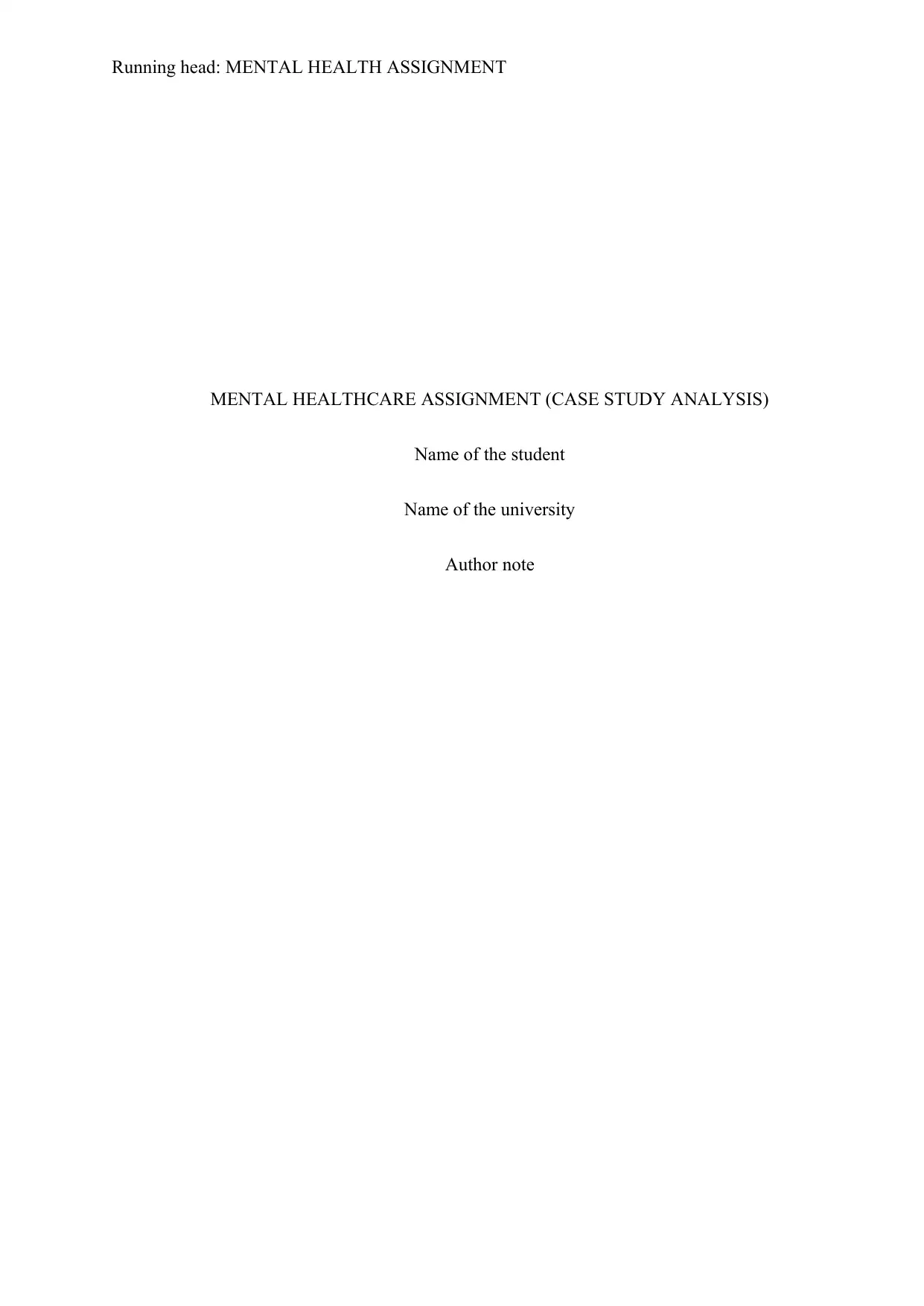
Running head: MENTAL HEALTH ASSIGNMENT
MENTAL HEALTHCARE ASSIGNMENT (CASE STUDY ANALYSIS)
Name of the student
Name of the university
Author note
MENTAL HEALTHCARE ASSIGNMENT (CASE STUDY ANALYSIS)
Name of the student
Name of the university
Author note
Secure Best Marks with AI Grader
Need help grading? Try our AI Grader for instant feedback on your assignments.
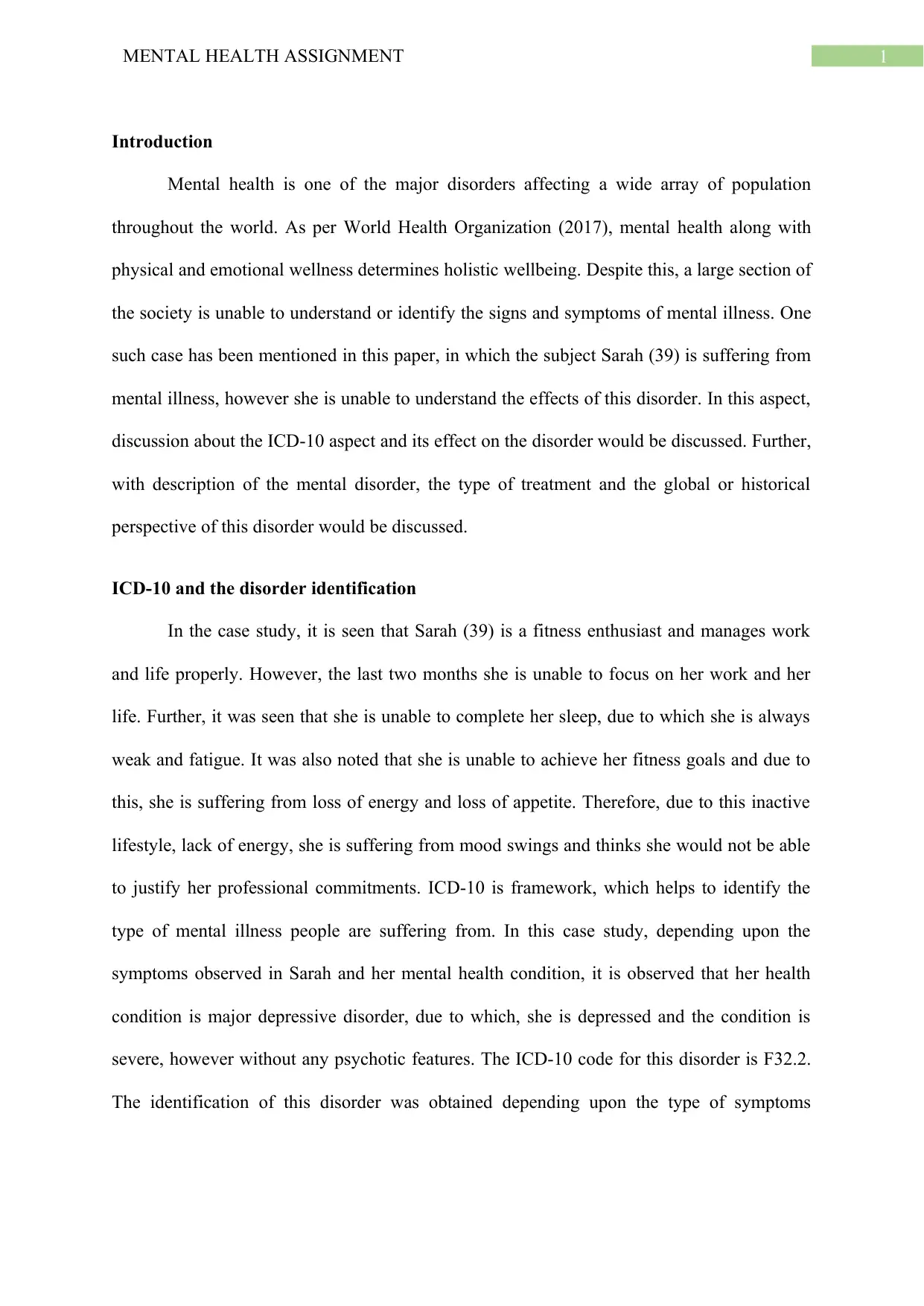
1MENTAL HEALTH ASSIGNMENT
Introduction
Mental health is one of the major disorders affecting a wide array of population
throughout the world. As per World Health Organization (2017), mental health along with
physical and emotional wellness determines holistic wellbeing. Despite this, a large section of
the society is unable to understand or identify the signs and symptoms of mental illness. One
such case has been mentioned in this paper, in which the subject Sarah (39) is suffering from
mental illness, however she is unable to understand the effects of this disorder. In this aspect,
discussion about the ICD-10 aspect and its effect on the disorder would be discussed. Further,
with description of the mental disorder, the type of treatment and the global or historical
perspective of this disorder would be discussed.
ICD-10 and the disorder identification
In the case study, it is seen that Sarah (39) is a fitness enthusiast and manages work
and life properly. However, the last two months she is unable to focus on her work and her
life. Further, it was seen that she is unable to complete her sleep, due to which she is always
weak and fatigue. It was also noted that she is unable to achieve her fitness goals and due to
this, she is suffering from loss of energy and loss of appetite. Therefore, due to this inactive
lifestyle, lack of energy, she is suffering from mood swings and thinks she would not be able
to justify her professional commitments. ICD-10 is framework, which helps to identify the
type of mental illness people are suffering from. In this case study, depending upon the
symptoms observed in Sarah and her mental health condition, it is observed that her health
condition is major depressive disorder, due to which, she is depressed and the condition is
severe, however without any psychotic features. The ICD-10 code for this disorder is F32.2.
The identification of this disorder was obtained depending upon the type of symptoms
Introduction
Mental health is one of the major disorders affecting a wide array of population
throughout the world. As per World Health Organization (2017), mental health along with
physical and emotional wellness determines holistic wellbeing. Despite this, a large section of
the society is unable to understand or identify the signs and symptoms of mental illness. One
such case has been mentioned in this paper, in which the subject Sarah (39) is suffering from
mental illness, however she is unable to understand the effects of this disorder. In this aspect,
discussion about the ICD-10 aspect and its effect on the disorder would be discussed. Further,
with description of the mental disorder, the type of treatment and the global or historical
perspective of this disorder would be discussed.
ICD-10 and the disorder identification
In the case study, it is seen that Sarah (39) is a fitness enthusiast and manages work
and life properly. However, the last two months she is unable to focus on her work and her
life. Further, it was seen that she is unable to complete her sleep, due to which she is always
weak and fatigue. It was also noted that she is unable to achieve her fitness goals and due to
this, she is suffering from loss of energy and loss of appetite. Therefore, due to this inactive
lifestyle, lack of energy, she is suffering from mood swings and thinks she would not be able
to justify her professional commitments. ICD-10 is framework, which helps to identify the
type of mental illness people are suffering from. In this case study, depending upon the
symptoms observed in Sarah and her mental health condition, it is observed that her health
condition is major depressive disorder, due to which, she is depressed and the condition is
severe, however without any psychotic features. The ICD-10 code for this disorder is F32.2.
The identification of this disorder was obtained depending upon the type of symptoms
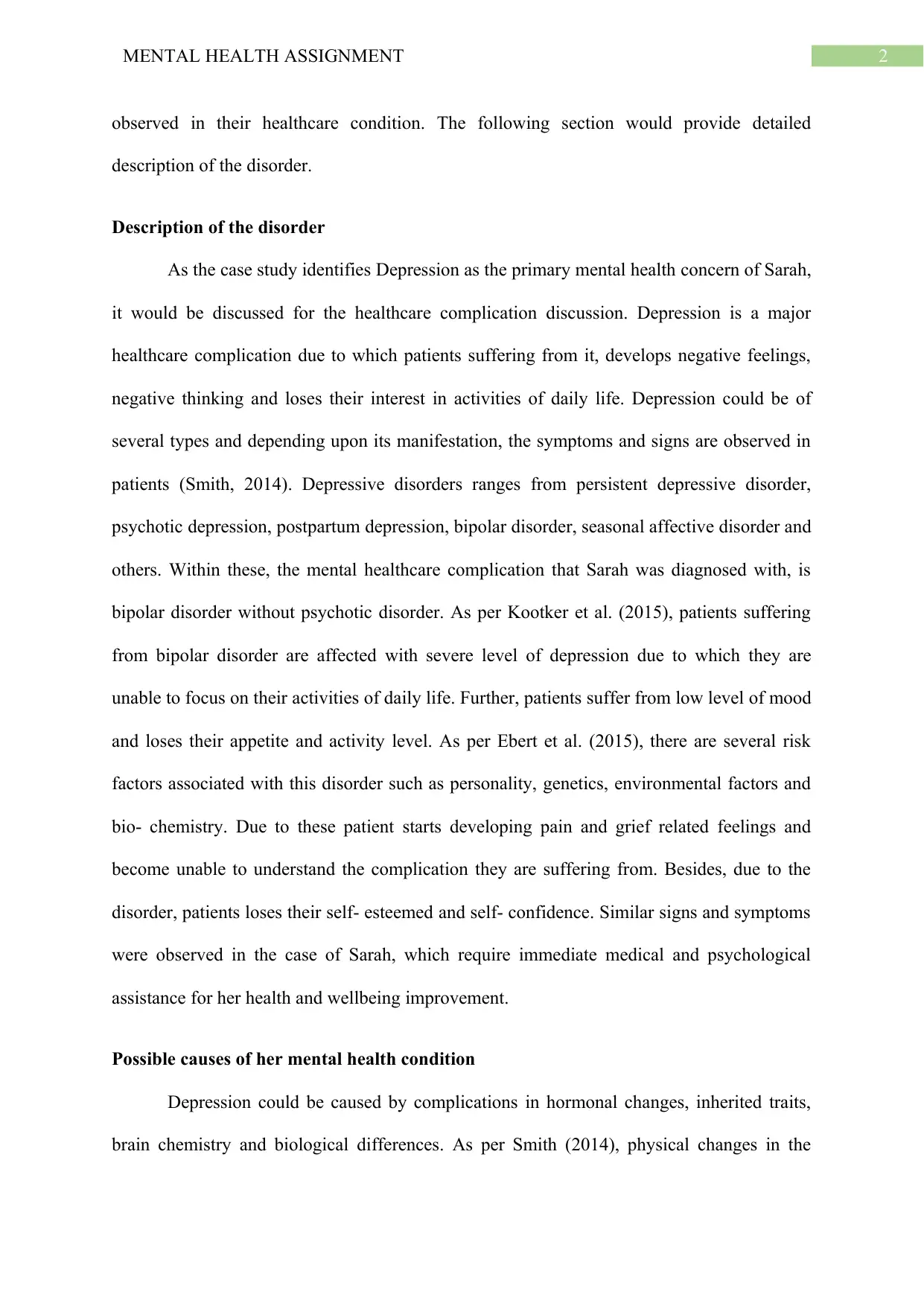
2MENTAL HEALTH ASSIGNMENT
observed in their healthcare condition. The following section would provide detailed
description of the disorder.
Description of the disorder
As the case study identifies Depression as the primary mental health concern of Sarah,
it would be discussed for the healthcare complication discussion. Depression is a major
healthcare complication due to which patients suffering from it, develops negative feelings,
negative thinking and loses their interest in activities of daily life. Depression could be of
several types and depending upon its manifestation, the symptoms and signs are observed in
patients (Smith, 2014). Depressive disorders ranges from persistent depressive disorder,
psychotic depression, postpartum depression, bipolar disorder, seasonal affective disorder and
others. Within these, the mental healthcare complication that Sarah was diagnosed with, is
bipolar disorder without psychotic disorder. As per Kootker et al. (2015), patients suffering
from bipolar disorder are affected with severe level of depression due to which they are
unable to focus on their activities of daily life. Further, patients suffer from low level of mood
and loses their appetite and activity level. As per Ebert et al. (2015), there are several risk
factors associated with this disorder such as personality, genetics, environmental factors and
bio- chemistry. Due to these patient starts developing pain and grief related feelings and
become unable to understand the complication they are suffering from. Besides, due to the
disorder, patients loses their self- esteemed and self- confidence. Similar signs and symptoms
were observed in the case of Sarah, which require immediate medical and psychological
assistance for her health and wellbeing improvement.
Possible causes of her mental health condition
Depression could be caused by complications in hormonal changes, inherited traits,
brain chemistry and biological differences. As per Smith (2014), physical changes in the
observed in their healthcare condition. The following section would provide detailed
description of the disorder.
Description of the disorder
As the case study identifies Depression as the primary mental health concern of Sarah,
it would be discussed for the healthcare complication discussion. Depression is a major
healthcare complication due to which patients suffering from it, develops negative feelings,
negative thinking and loses their interest in activities of daily life. Depression could be of
several types and depending upon its manifestation, the symptoms and signs are observed in
patients (Smith, 2014). Depressive disorders ranges from persistent depressive disorder,
psychotic depression, postpartum depression, bipolar disorder, seasonal affective disorder and
others. Within these, the mental healthcare complication that Sarah was diagnosed with, is
bipolar disorder without psychotic disorder. As per Kootker et al. (2015), patients suffering
from bipolar disorder are affected with severe level of depression due to which they are
unable to focus on their activities of daily life. Further, patients suffer from low level of mood
and loses their appetite and activity level. As per Ebert et al. (2015), there are several risk
factors associated with this disorder such as personality, genetics, environmental factors and
bio- chemistry. Due to these patient starts developing pain and grief related feelings and
become unable to understand the complication they are suffering from. Besides, due to the
disorder, patients loses their self- esteemed and self- confidence. Similar signs and symptoms
were observed in the case of Sarah, which require immediate medical and psychological
assistance for her health and wellbeing improvement.
Possible causes of her mental health condition
Depression could be caused by complications in hormonal changes, inherited traits,
brain chemistry and biological differences. As per Smith (2014), physical changes in the
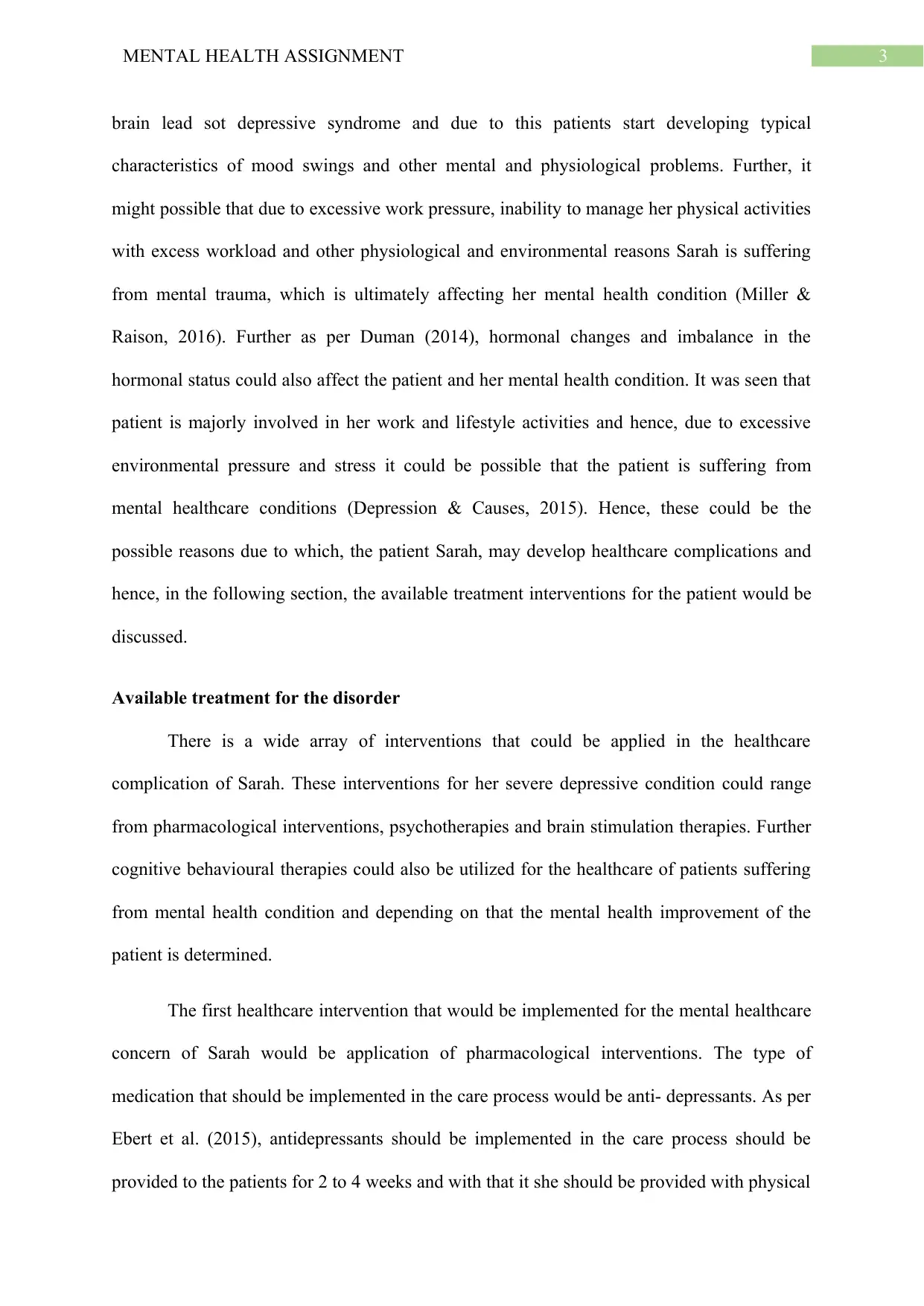
3MENTAL HEALTH ASSIGNMENT
brain lead sot depressive syndrome and due to this patients start developing typical
characteristics of mood swings and other mental and physiological problems. Further, it
might possible that due to excessive work pressure, inability to manage her physical activities
with excess workload and other physiological and environmental reasons Sarah is suffering
from mental trauma, which is ultimately affecting her mental health condition (Miller &
Raison, 2016). Further as per Duman (2014), hormonal changes and imbalance in the
hormonal status could also affect the patient and her mental health condition. It was seen that
patient is majorly involved in her work and lifestyle activities and hence, due to excessive
environmental pressure and stress it could be possible that the patient is suffering from
mental healthcare conditions (Depression & Causes, 2015). Hence, these could be the
possible reasons due to which, the patient Sarah, may develop healthcare complications and
hence, in the following section, the available treatment interventions for the patient would be
discussed.
Available treatment for the disorder
There is a wide array of interventions that could be applied in the healthcare
complication of Sarah. These interventions for her severe depressive condition could range
from pharmacological interventions, psychotherapies and brain stimulation therapies. Further
cognitive behavioural therapies could also be utilized for the healthcare of patients suffering
from mental health condition and depending on that the mental health improvement of the
patient is determined.
The first healthcare intervention that would be implemented for the mental healthcare
concern of Sarah would be application of pharmacological interventions. The type of
medication that should be implemented in the care process would be anti- depressants. As per
Ebert et al. (2015), antidepressants should be implemented in the care process should be
provided to the patients for 2 to 4 weeks and with that it she should be provided with physical
brain lead sot depressive syndrome and due to this patients start developing typical
characteristics of mood swings and other mental and physiological problems. Further, it
might possible that due to excessive work pressure, inability to manage her physical activities
with excess workload and other physiological and environmental reasons Sarah is suffering
from mental trauma, which is ultimately affecting her mental health condition (Miller &
Raison, 2016). Further as per Duman (2014), hormonal changes and imbalance in the
hormonal status could also affect the patient and her mental health condition. It was seen that
patient is majorly involved in her work and lifestyle activities and hence, due to excessive
environmental pressure and stress it could be possible that the patient is suffering from
mental healthcare conditions (Depression & Causes, 2015). Hence, these could be the
possible reasons due to which, the patient Sarah, may develop healthcare complications and
hence, in the following section, the available treatment interventions for the patient would be
discussed.
Available treatment for the disorder
There is a wide array of interventions that could be applied in the healthcare
complication of Sarah. These interventions for her severe depressive condition could range
from pharmacological interventions, psychotherapies and brain stimulation therapies. Further
cognitive behavioural therapies could also be utilized for the healthcare of patients suffering
from mental health condition and depending on that the mental health improvement of the
patient is determined.
The first healthcare intervention that would be implemented for the mental healthcare
concern of Sarah would be application of pharmacological interventions. The type of
medication that should be implemented in the care process would be anti- depressants. As per
Ebert et al. (2015), antidepressants should be implemented in the care process should be
provided to the patients for 2 to 4 weeks and with that it she should be provided with physical
Secure Best Marks with AI Grader
Need help grading? Try our AI Grader for instant feedback on your assignments.
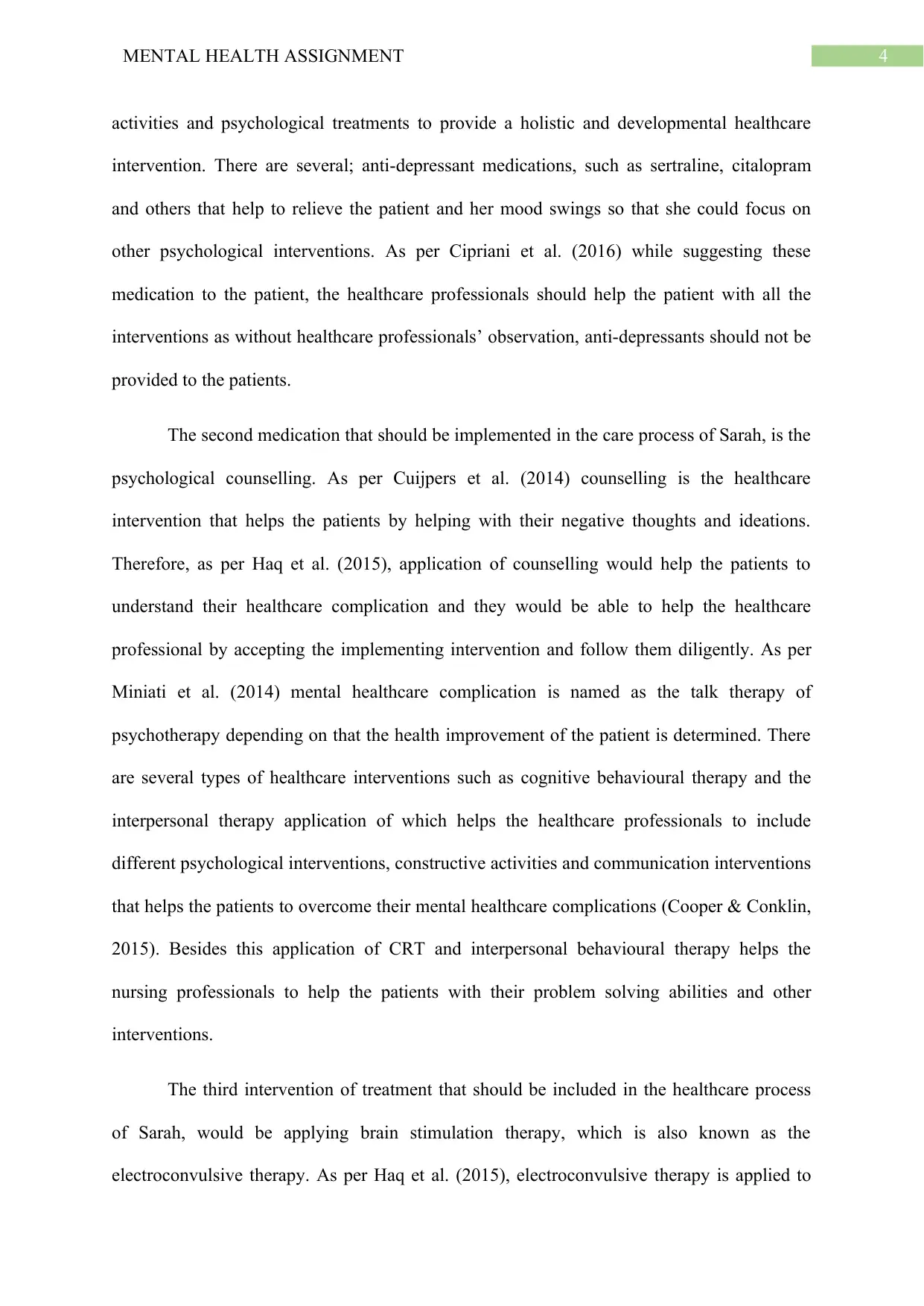
4MENTAL HEALTH ASSIGNMENT
activities and psychological treatments to provide a holistic and developmental healthcare
intervention. There are several; anti-depressant medications, such as sertraline, citalopram
and others that help to relieve the patient and her mood swings so that she could focus on
other psychological interventions. As per Cipriani et al. (2016) while suggesting these
medication to the patient, the healthcare professionals should help the patient with all the
interventions as without healthcare professionals’ observation, anti-depressants should not be
provided to the patients.
The second medication that should be implemented in the care process of Sarah, is the
psychological counselling. As per Cuijpers et al. (2014) counselling is the healthcare
intervention that helps the patients by helping with their negative thoughts and ideations.
Therefore, as per Haq et al. (2015), application of counselling would help the patients to
understand their healthcare complication and they would be able to help the healthcare
professional by accepting the implementing intervention and follow them diligently. As per
Miniati et al. (2014) mental healthcare complication is named as the talk therapy of
psychotherapy depending on that the health improvement of the patient is determined. There
are several types of healthcare interventions such as cognitive behavioural therapy and the
interpersonal therapy application of which helps the healthcare professionals to include
different psychological interventions, constructive activities and communication interventions
that helps the patients to overcome their mental healthcare complications (Cooper & Conklin,
2015). Besides this application of CRT and interpersonal behavioural therapy helps the
nursing professionals to help the patients with their problem solving abilities and other
interventions.
The third intervention of treatment that should be included in the healthcare process
of Sarah, would be applying brain stimulation therapy, which is also known as the
electroconvulsive therapy. As per Haq et al. (2015), electroconvulsive therapy is applied to
activities and psychological treatments to provide a holistic and developmental healthcare
intervention. There are several; anti-depressant medications, such as sertraline, citalopram
and others that help to relieve the patient and her mood swings so that she could focus on
other psychological interventions. As per Cipriani et al. (2016) while suggesting these
medication to the patient, the healthcare professionals should help the patient with all the
interventions as without healthcare professionals’ observation, anti-depressants should not be
provided to the patients.
The second medication that should be implemented in the care process of Sarah, is the
psychological counselling. As per Cuijpers et al. (2014) counselling is the healthcare
intervention that helps the patients by helping with their negative thoughts and ideations.
Therefore, as per Haq et al. (2015), application of counselling would help the patients to
understand their healthcare complication and they would be able to help the healthcare
professional by accepting the implementing intervention and follow them diligently. As per
Miniati et al. (2014) mental healthcare complication is named as the talk therapy of
psychotherapy depending on that the health improvement of the patient is determined. There
are several types of healthcare interventions such as cognitive behavioural therapy and the
interpersonal therapy application of which helps the healthcare professionals to include
different psychological interventions, constructive activities and communication interventions
that helps the patients to overcome their mental healthcare complications (Cooper & Conklin,
2015). Besides this application of CRT and interpersonal behavioural therapy helps the
nursing professionals to help the patients with their problem solving abilities and other
interventions.
The third intervention of treatment that should be included in the healthcare process
of Sarah, would be applying brain stimulation therapy, which is also known as the
electroconvulsive therapy. As per Haq et al. (2015), electroconvulsive therapy is applied to
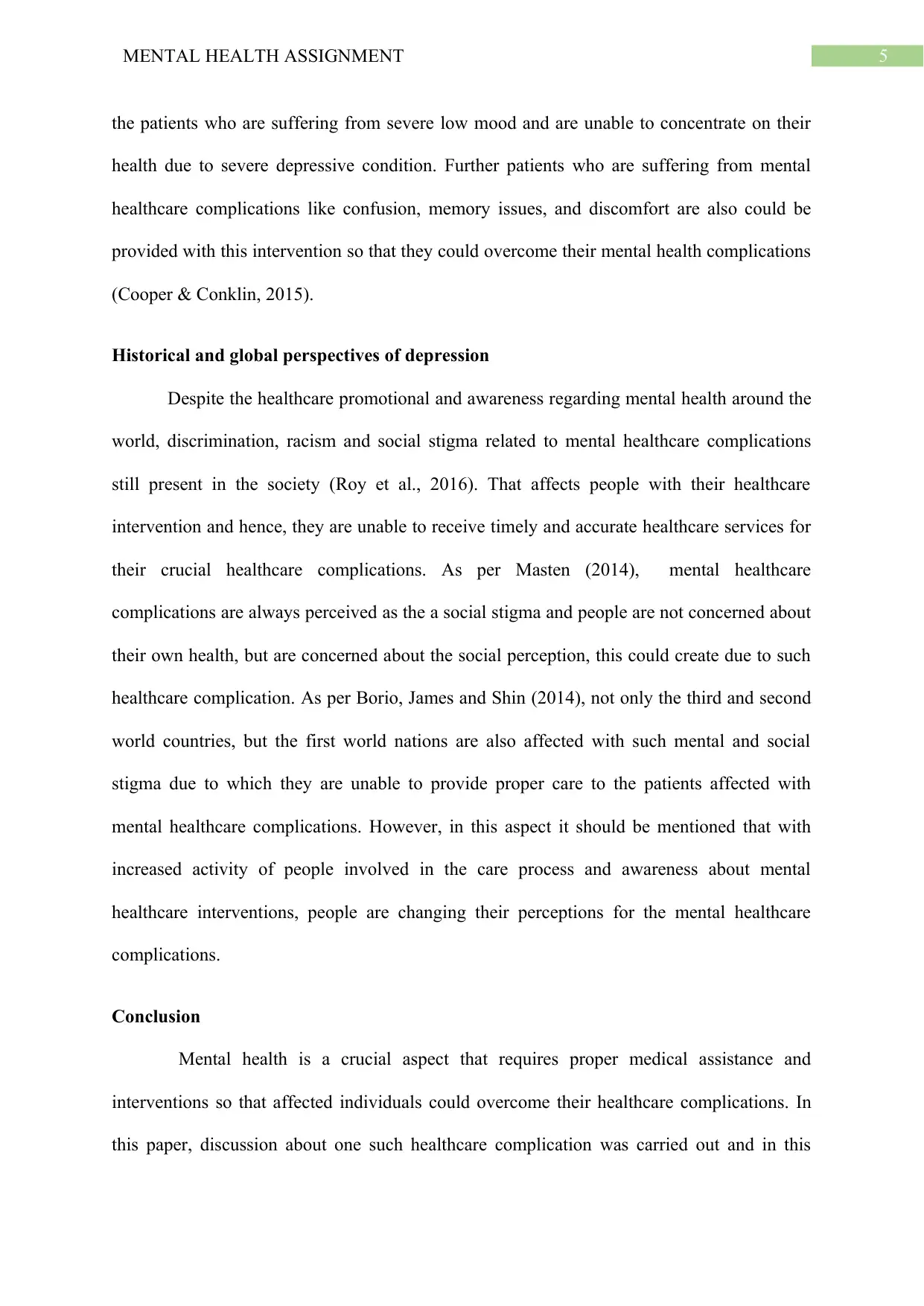
5MENTAL HEALTH ASSIGNMENT
the patients who are suffering from severe low mood and are unable to concentrate on their
health due to severe depressive condition. Further patients who are suffering from mental
healthcare complications like confusion, memory issues, and discomfort are also could be
provided with this intervention so that they could overcome their mental health complications
(Cooper & Conklin, 2015).
Historical and global perspectives of depression
Despite the healthcare promotional and awareness regarding mental health around the
world, discrimination, racism and social stigma related to mental healthcare complications
still present in the society (Roy et al., 2016). That affects people with their healthcare
intervention and hence, they are unable to receive timely and accurate healthcare services for
their crucial healthcare complications. As per Masten (2014), mental healthcare
complications are always perceived as the a social stigma and people are not concerned about
their own health, but are concerned about the social perception, this could create due to such
healthcare complication. As per Borio, James and Shin (2014), not only the third and second
world countries, but the first world nations are also affected with such mental and social
stigma due to which they are unable to provide proper care to the patients affected with
mental healthcare complications. However, in this aspect it should be mentioned that with
increased activity of people involved in the care process and awareness about mental
healthcare interventions, people are changing their perceptions for the mental healthcare
complications.
Conclusion
Mental health is a crucial aspect that requires proper medical assistance and
interventions so that affected individuals could overcome their healthcare complications. In
this paper, discussion about one such healthcare complication was carried out and in this
the patients who are suffering from severe low mood and are unable to concentrate on their
health due to severe depressive condition. Further patients who are suffering from mental
healthcare complications like confusion, memory issues, and discomfort are also could be
provided with this intervention so that they could overcome their mental health complications
(Cooper & Conklin, 2015).
Historical and global perspectives of depression
Despite the healthcare promotional and awareness regarding mental health around the
world, discrimination, racism and social stigma related to mental healthcare complications
still present in the society (Roy et al., 2016). That affects people with their healthcare
intervention and hence, they are unable to receive timely and accurate healthcare services for
their crucial healthcare complications. As per Masten (2014), mental healthcare
complications are always perceived as the a social stigma and people are not concerned about
their own health, but are concerned about the social perception, this could create due to such
healthcare complication. As per Borio, James and Shin (2014), not only the third and second
world countries, but the first world nations are also affected with such mental and social
stigma due to which they are unable to provide proper care to the patients affected with
mental healthcare complications. However, in this aspect it should be mentioned that with
increased activity of people involved in the care process and awareness about mental
healthcare interventions, people are changing their perceptions for the mental healthcare
complications.
Conclusion
Mental health is a crucial aspect that requires proper medical assistance and
interventions so that affected individuals could overcome their healthcare complications. In
this paper, discussion about one such healthcare complication was carried out and in this
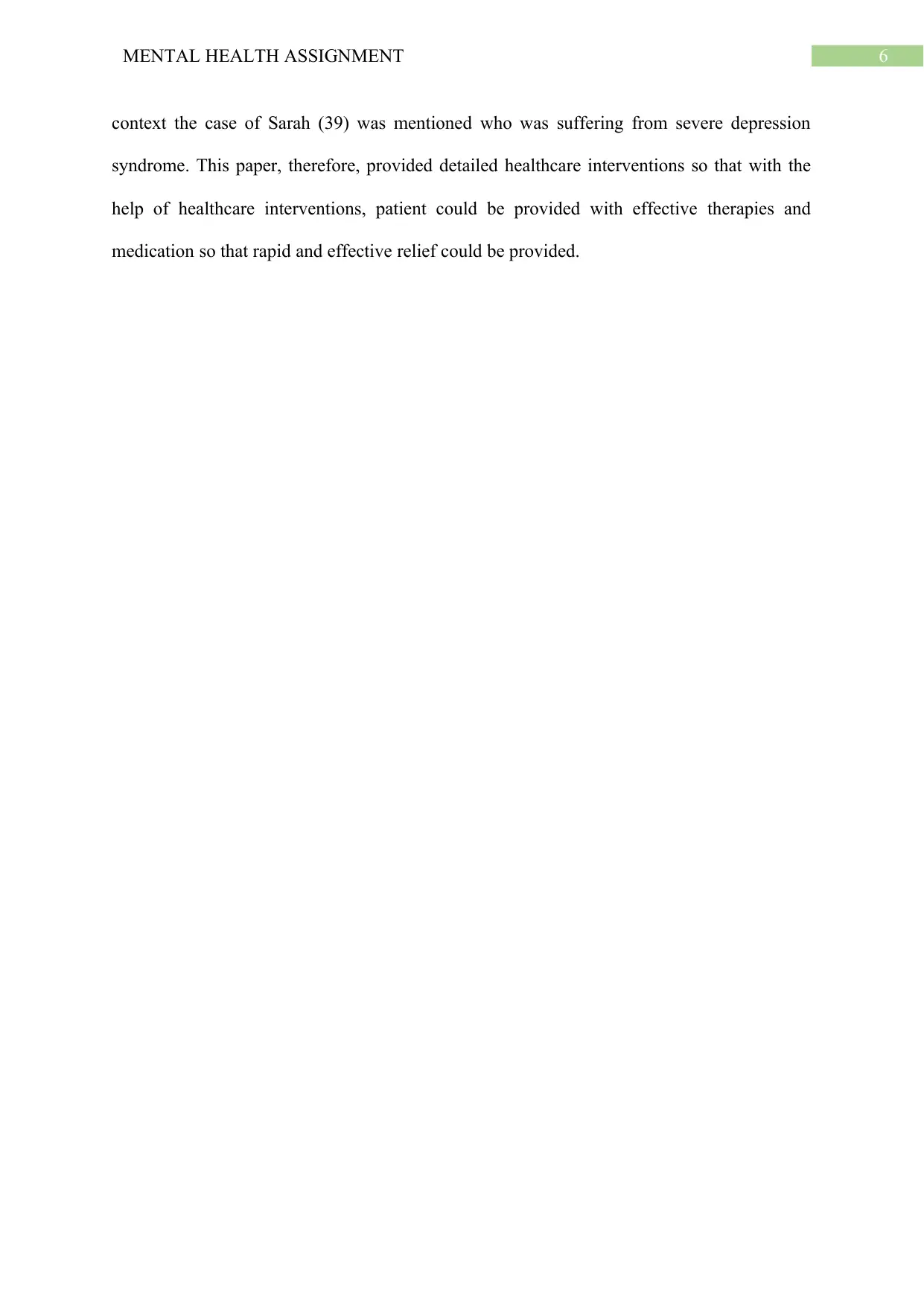
6MENTAL HEALTH ASSIGNMENT
context the case of Sarah (39) was mentioned who was suffering from severe depression
syndrome. This paper, therefore, provided detailed healthcare interventions so that with the
help of healthcare interventions, patient could be provided with effective therapies and
medication so that rapid and effective relief could be provided.
context the case of Sarah (39) was mentioned who was suffering from severe depression
syndrome. This paper, therefore, provided detailed healthcare interventions so that with the
help of healthcare interventions, patient could be provided with effective therapies and
medication so that rapid and effective relief could be provided.
Paraphrase This Document
Need a fresh take? Get an instant paraphrase of this document with our AI Paraphraser
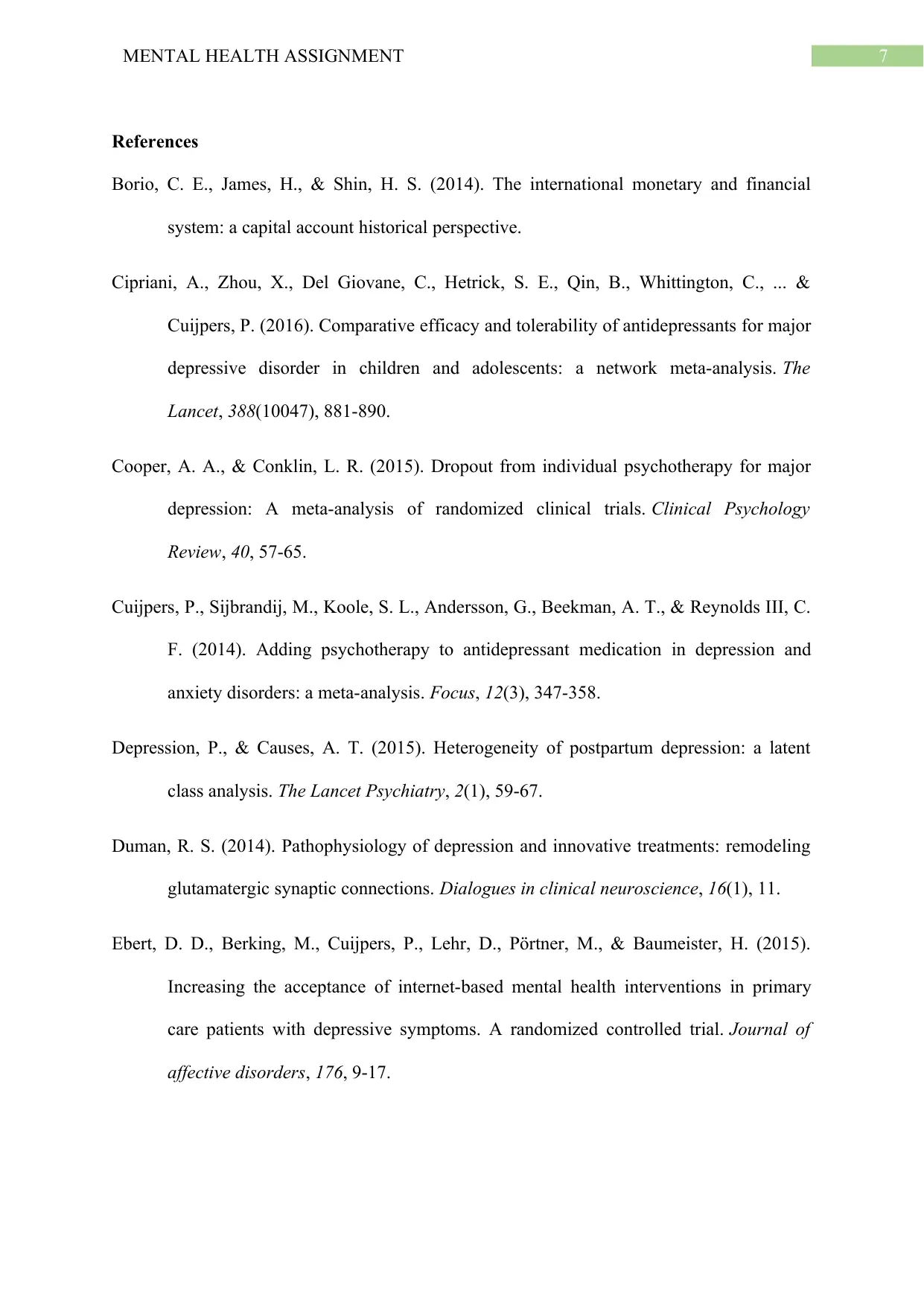
7MENTAL HEALTH ASSIGNMENT
References
Borio, C. E., James, H., & Shin, H. S. (2014). The international monetary and financial
system: a capital account historical perspective.
Cipriani, A., Zhou, X., Del Giovane, C., Hetrick, S. E., Qin, B., Whittington, C., ... &
Cuijpers, P. (2016). Comparative efficacy and tolerability of antidepressants for major
depressive disorder in children and adolescents: a network meta-analysis. The
Lancet, 388(10047), 881-890.
Cooper, A. A., & Conklin, L. R. (2015). Dropout from individual psychotherapy for major
depression: A meta-analysis of randomized clinical trials. Clinical Psychology
Review, 40, 57-65.
Cuijpers, P., Sijbrandij, M., Koole, S. L., Andersson, G., Beekman, A. T., & Reynolds III, C.
F. (2014). Adding psychotherapy to antidepressant medication in depression and
anxiety disorders: a meta-analysis. Focus, 12(3), 347-358.
Depression, P., & Causes, A. T. (2015). Heterogeneity of postpartum depression: a latent
class analysis. The Lancet Psychiatry, 2(1), 59-67.
Duman, R. S. (2014). Pathophysiology of depression and innovative treatments: remodeling
glutamatergic synaptic connections. Dialogues in clinical neuroscience, 16(1), 11.
Ebert, D. D., Berking, M., Cuijpers, P., Lehr, D., Pörtner, M., & Baumeister, H. (2015).
Increasing the acceptance of internet-based mental health interventions in primary
care patients with depressive symptoms. A randomized controlled trial. Journal of
affective disorders, 176, 9-17.
References
Borio, C. E., James, H., & Shin, H. S. (2014). The international monetary and financial
system: a capital account historical perspective.
Cipriani, A., Zhou, X., Del Giovane, C., Hetrick, S. E., Qin, B., Whittington, C., ... &
Cuijpers, P. (2016). Comparative efficacy and tolerability of antidepressants for major
depressive disorder in children and adolescents: a network meta-analysis. The
Lancet, 388(10047), 881-890.
Cooper, A. A., & Conklin, L. R. (2015). Dropout from individual psychotherapy for major
depression: A meta-analysis of randomized clinical trials. Clinical Psychology
Review, 40, 57-65.
Cuijpers, P., Sijbrandij, M., Koole, S. L., Andersson, G., Beekman, A. T., & Reynolds III, C.
F. (2014). Adding psychotherapy to antidepressant medication in depression and
anxiety disorders: a meta-analysis. Focus, 12(3), 347-358.
Depression, P., & Causes, A. T. (2015). Heterogeneity of postpartum depression: a latent
class analysis. The Lancet Psychiatry, 2(1), 59-67.
Duman, R. S. (2014). Pathophysiology of depression and innovative treatments: remodeling
glutamatergic synaptic connections. Dialogues in clinical neuroscience, 16(1), 11.
Ebert, D. D., Berking, M., Cuijpers, P., Lehr, D., Pörtner, M., & Baumeister, H. (2015).
Increasing the acceptance of internet-based mental health interventions in primary
care patients with depressive symptoms. A randomized controlled trial. Journal of
affective disorders, 176, 9-17.
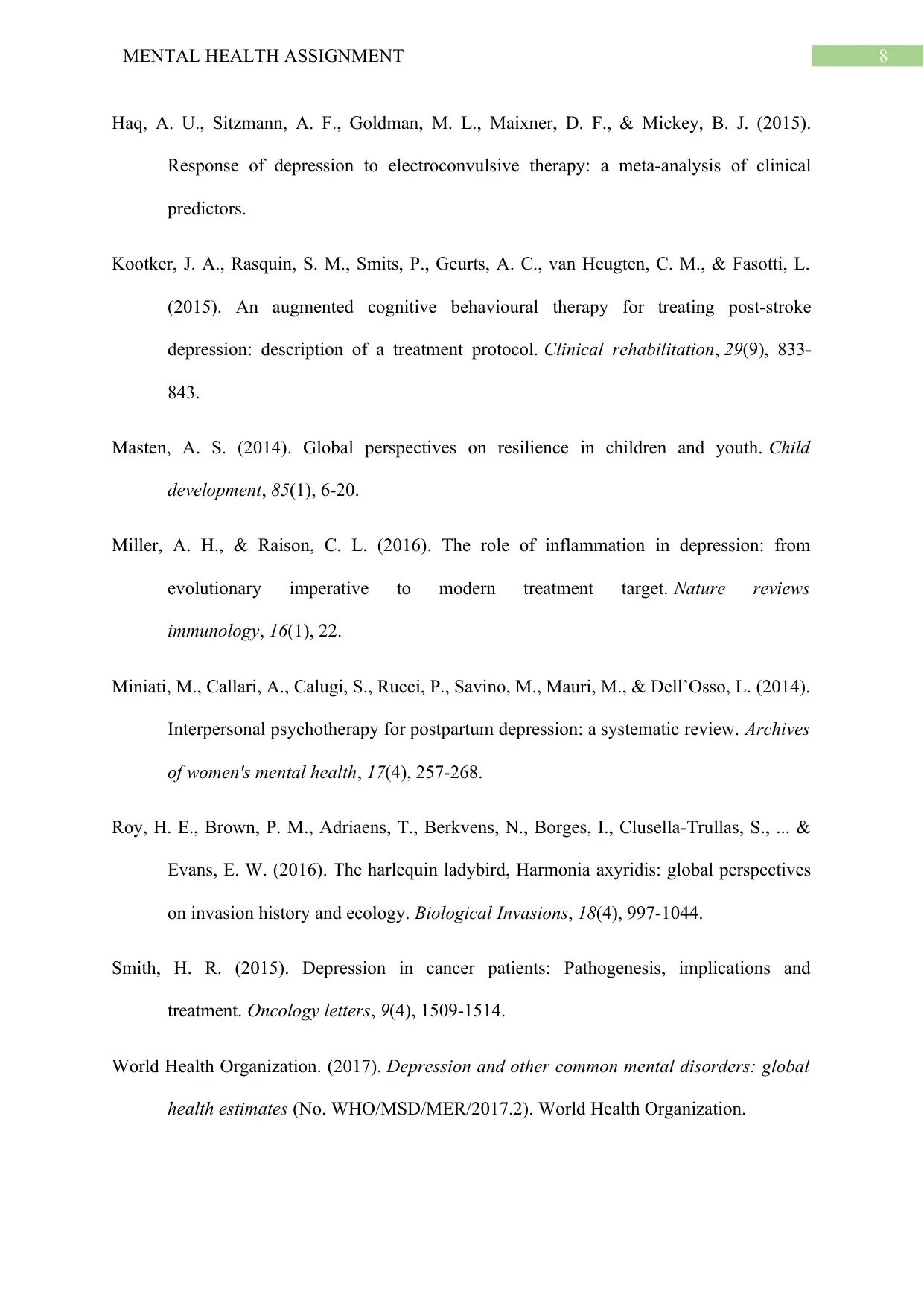
8MENTAL HEALTH ASSIGNMENT
Haq, A. U., Sitzmann, A. F., Goldman, M. L., Maixner, D. F., & Mickey, B. J. (2015).
Response of depression to electroconvulsive therapy: a meta-analysis of clinical
predictors.
Kootker, J. A., Rasquin, S. M., Smits, P., Geurts, A. C., van Heugten, C. M., & Fasotti, L.
(2015). An augmented cognitive behavioural therapy for treating post-stroke
depression: description of a treatment protocol. Clinical rehabilitation, 29(9), 833-
843.
Masten, A. S. (2014). Global perspectives on resilience in children and youth. Child
development, 85(1), 6-20.
Miller, A. H., & Raison, C. L. (2016). The role of inflammation in depression: from
evolutionary imperative to modern treatment target. Nature reviews
immunology, 16(1), 22.
Miniati, M., Callari, A., Calugi, S., Rucci, P., Savino, M., Mauri, M., & Dell’Osso, L. (2014).
Interpersonal psychotherapy for postpartum depression: a systematic review. Archives
of women's mental health, 17(4), 257-268.
Roy, H. E., Brown, P. M., Adriaens, T., Berkvens, N., Borges, I., Clusella-Trullas, S., ... &
Evans, E. W. (2016). The harlequin ladybird, Harmonia axyridis: global perspectives
on invasion history and ecology. Biological Invasions, 18(4), 997-1044.
Smith, H. R. (2015). Depression in cancer patients: Pathogenesis, implications and
treatment. Oncology letters, 9(4), 1509-1514.
World Health Organization. (2017). Depression and other common mental disorders: global
health estimates (No. WHO/MSD/MER/2017.2). World Health Organization.
Haq, A. U., Sitzmann, A. F., Goldman, M. L., Maixner, D. F., & Mickey, B. J. (2015).
Response of depression to electroconvulsive therapy: a meta-analysis of clinical
predictors.
Kootker, J. A., Rasquin, S. M., Smits, P., Geurts, A. C., van Heugten, C. M., & Fasotti, L.
(2015). An augmented cognitive behavioural therapy for treating post-stroke
depression: description of a treatment protocol. Clinical rehabilitation, 29(9), 833-
843.
Masten, A. S. (2014). Global perspectives on resilience in children and youth. Child
development, 85(1), 6-20.
Miller, A. H., & Raison, C. L. (2016). The role of inflammation in depression: from
evolutionary imperative to modern treatment target. Nature reviews
immunology, 16(1), 22.
Miniati, M., Callari, A., Calugi, S., Rucci, P., Savino, M., Mauri, M., & Dell’Osso, L. (2014).
Interpersonal psychotherapy for postpartum depression: a systematic review. Archives
of women's mental health, 17(4), 257-268.
Roy, H. E., Brown, P. M., Adriaens, T., Berkvens, N., Borges, I., Clusella-Trullas, S., ... &
Evans, E. W. (2016). The harlequin ladybird, Harmonia axyridis: global perspectives
on invasion history and ecology. Biological Invasions, 18(4), 997-1044.
Smith, H. R. (2015). Depression in cancer patients: Pathogenesis, implications and
treatment. Oncology letters, 9(4), 1509-1514.
World Health Organization. (2017). Depression and other common mental disorders: global
health estimates (No. WHO/MSD/MER/2017.2). World Health Organization.
1 out of 9
Related Documents
Your All-in-One AI-Powered Toolkit for Academic Success.
+13062052269
info@desklib.com
Available 24*7 on WhatsApp / Email
![[object Object]](/_next/static/media/star-bottom.7253800d.svg)
Unlock your academic potential
© 2024 | Zucol Services PVT LTD | All rights reserved.




